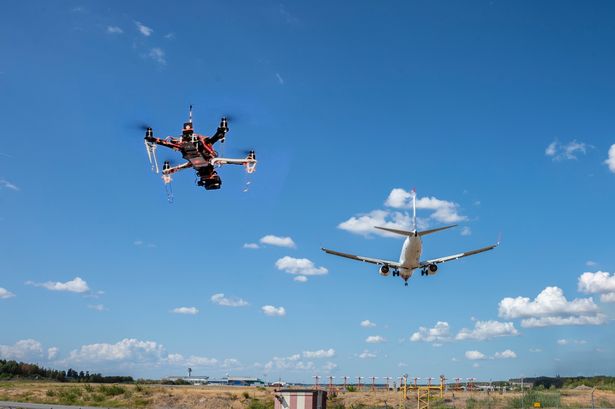Birmingham Airport officials have expressed serious concerns regarding the Civil Aviation Authority’s (CAA) proposal to permit the operation of US military drones within UK airspace, specifically impacting a crucial high-traffic route used by commercial aircraft. This airspace, designated as EG R41, is a vital artery for flights arriving and departing from Birmingham Airport, connecting it to major European destinations. Its closure, even temporarily, would disrupt thousands of passengers and have significant economic repercussions for the airport and the wider region. The airport’s management contends that the CAA’s plan lacks transparency and adequate consultation with key stakeholders, including airlines, airports, and local communities. They argue that the potential risks associated with integrating large, unmanned military aircraft into civilian airspace have not been fully evaluated, jeopardizing the safety and efficiency of commercial air travel. The airport bosses are calling for a comprehensive risk assessment and a more collaborative approach to ensure that any proposed changes to airspace usage prioritize safety and minimize disruption to passenger travel.
The heart of the issue lies in the potential conflict between military operations and the already congested civilian airspace. Integrating large, sophisticated military drones, which often require dedicated airspace and specialized communication protocols, into the existing network presents significant logistical and safety challenges. The scale of these drones, their operational requirements, and the potential for unforeseen technical issues raise concerns about the ability of the current air traffic control systems to manage the increased complexity. Furthermore, the lack of clarity regarding the frequency and duration of drone operations within EG R41 adds to the uncertainty and makes it difficult for airlines and airports to plan effectively. Birmingham Airport argues that the CAA’s current proposal fails to adequately address these concerns, potentially leading to flight delays, cancellations, and increased operational costs for airlines. These disruptions would not only inconvenience passengers but also impact the airport’s revenue streams and its ability to maintain vital services. The economic ramifications extend beyond the airport itself, potentially affecting businesses that rely on air travel for trade and tourism.
The airport’s management emphasizes the critical need for thorough and transparent risk assessment before implementing such significant changes to airspace usage. They contend that the CAA’s current assessment falls short, lacking a detailed analysis of the potential hazards associated with drone operations in close proximity to commercial aircraft. This includes the risks of mid-air collisions, communication interference, and the potential for system failures that could compromise the safety of passenger flights. Furthermore, the airport questions the adequacy of contingency plans in the event of an emergency involving a drone, particularly given the differences in emergency procedures for manned and unmanned aircraft. The airport’s call for a more comprehensive risk assessment aligns with the broader aviation industry’s emphasis on safety as a paramount concern. They advocate for an approach that involves independent experts and utilizes advanced modeling and simulation techniques to evaluate the full spectrum of potential hazards and develop appropriate mitigation strategies.
A major point of contention revolves around the perceived lack of consultation with key stakeholders. Birmingham Airport argues that the CAA’s engagement process has been insufficient, failing to adequately consider the operational realities and economic concerns of airports, airlines, and the local communities they serve. Effective airspace management requires close collaboration between all stakeholders, ensuring that any proposed changes are thoroughly vetted and implemented in a way that minimizes disruption. The airport asserts that the current proposal lacks this crucial element, potentially leading to unintended consequences and unnecessary conflict. They advocate for a more inclusive and collaborative approach, involving open dialogue and transparent communication to address the concerns of all affected parties. This collaborative approach, they believe, is essential for building trust and ensuring that any decisions regarding airspace usage are made in the best interests of safety and efficiency.
Beyond the immediate concerns related to airspace management, the airport’s opposition to the drone proposal reflects broader anxieties about the increasing integration of unmanned aircraft into civilian airspace. As drone technology advances and their use becomes more widespread, the need for robust regulatory frameworks and effective communication protocols becomes increasingly critical. The Birmingham Airport situation highlights the challenges of balancing the potential benefits of drone technology with the need to safeguard the safety and efficiency of traditional air travel. The airport’s call for greater scrutiny and transparency reflects the broader aviation industry’s cautious approach to drone integration, recognizing the potential for unintended consequences if proper safeguards are not in place. This cautious approach is not intended to stifle innovation but rather to ensure that the integration of new technologies is managed responsibly, minimizing risks and maximizing benefits for all stakeholders.
The dispute over the proposed drone operations at Birmingham Airport underscores the complex challenges of managing increasingly congested airspace and integrating new technologies while maintaining the highest standards of safety and efficiency. The airport’s concerns regarding risk assessment, consultation, and the broader implications of drone integration resonate with the wider aviation industry. Their call for a more collaborative and transparent approach is crucial for ensuring that any decisions regarding airspace usage are made in the best interests of all stakeholders, balancing the needs of military operations with the paramount importance of passenger safety and the smooth functioning of commercial air travel. The outcome of this dispute will have significant implications for the future of airspace management, particularly as drone technology continues to evolve and its applications expand. Addressing the concerns raised by Birmingham Airport is essential for building a regulatory framework that supports innovation while safeguarding the integrity of the aviation industry.














